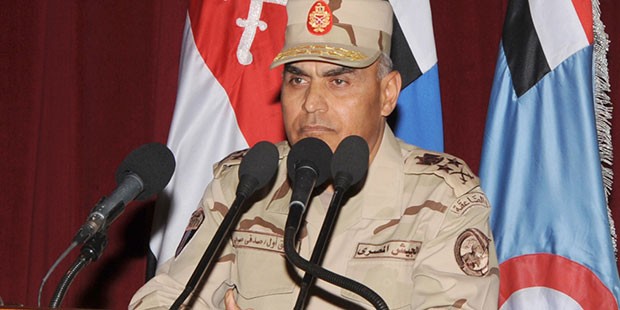 On 12-13 January, the UK and Egypt held the 10th round of regular military-to-military staff talks in Cairo.
On 12-13 January, the UK and Egypt held the 10th round of regular military-to-military staff talks in Cairo.The talks focused on deepening military cooperation between the two countries and on tackling challenges to stability across the Middle East and North Africa region.
The visiting British delegation was led by Rear Admiral Simon Ancona, Assistant Chief of Defence Staff (Defence Engagement) – one of the British military’s most senior figures.
Admiral Ancona said:
“Egypt is a key strategic partner in a region of vital importance to the UK. These talks are crucial in helping us strengthen and deepen our partnership, so that we are equipped to confront and defeat those who want to spread extremism and violence in this region.”
The UK and Egypt already enjoy a close military partnership. UK armed forces have provided their Egyptian counterparts with life-saving counter-IED training. Every year, the UK offers a number of Egyptian officers places to study at highly prestigious military academies, including Royal Military Academy Sandhurst.
The UK and Egypt have worked tirelessly with Libyans across the political spectrum and with international partners to help reach the political agreement, which was signed on 17 December.
British Ambassador John Casson said:
“The UK stands shoulder-to-shoulder with Egypt in the fight against extremism and terrorism; we will not leave this fight to Egypt alone. Our two countries are on the frontline and we will not rest until the scourge of Daesh is defeated – whether in Syria and Iraq or North Sinai.
“And now that we have a political agreement in Libya, I look forward to the UK and Egypt working together in support of a new Libyan government that can lead the fight in defeating Daesh and restoring stability to the country.”
The UK and Egypt are both partners in the Global Coalition against Daesh. As part of the Global Coalition, the UK has carried out around more than 1800 combat missions over Iraq and Syria. Beyond military action, the UK is working with partners to cut off Daesh’s access to finance, reduce the movement of extremists, and defeat the group’s poisonous narrative.
The UK has also allocated £79.5 million in humanitarian aid to help thousands of vulnerable displaced families across Iraq, in addition to the £1.1 billion spent since 2012 in supporting Syrians affected by the war between the Assad regime, extremist groups, and the moderate opposition.



